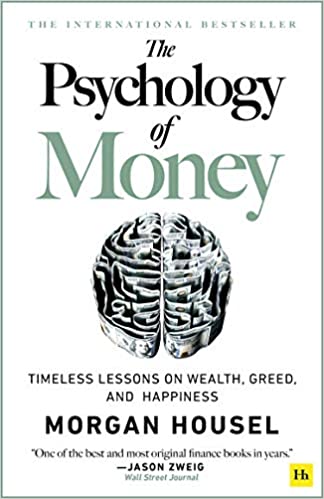This post is part of the 📖 The Psychology of Money series.
Today, I am reading second chapter Luck & Risk from the book The Psychology of Money: Timeless lessons on wealth, greed, and happiness written by Author, Morgan Housel.
Doing well with money isn’t necessarily about what you know. It’s about how you behave. And behavior is hard to teach, even to really smart people.
In The Psychology of Money, award-winning author Morgan Housel shares 19 short stories exploring the strange ways people think about money and teaches you how to make better sense of one of life’s most important topics.
Yesterday, I read the first short story No One’s Crazy from the book The Psychology of Money.
Luck & Risk
Luck and risk are siblings. They are both the reality that every outcome in life is guided by forces other than individual effort.
The line between bold and reckless can be thin. When we don’t give risk and luck their proper billing, it’s often invisible.
“The customer is always right” and “customers don’t know what they want” are both accepted business wisdom.
The line between “inspiringly bold” and “foolishly reckless” can be a millimetre thick and only visible with hindsight.
Risk and luck are doppelgangers.
But two things can point you in a better direction.
Be careful who you praise and admire.
Be careful who you look down upon and wish to avoid becoming.Therefore, focus less on specific individuals and case studies and more on broad patterns.
The trick when dealing with failure is arranging your financial life in a way that a bad investment here and a missed financial goal there won’t wipe you out, so you can keep playing until the odds fall in your favour.
More importantly, as much as we recognize the role of luck in success, the role of risk means we should forgive ourselves and leave room for understanding when judging failures. Nothing is as good or as bad as it seems.
Key Takeaways
- The difficulty in identifying luck, what is skill, and what is risk is one of the biggest problems we face when trying to learn about the best way to manage money.
Summary
The more extreme the outcome, the less likely you can apply its lessons to your own life because the more likely the outcome was influenced by extreme ends of luck or risk.
You’ll get closer to actionable takeaways by looking for broad patterns of success and failure. The more common the pattern, the more applicable it might be to your life.
That’s it for today. Tomorrow, we will read a new chapter Never Enough, look at the stories of two men who pushed their luck.
No One’s Crazy
Every decision people make with money is justified by taking the information they have at the moment and plugging it into their unique mental model of how the world works.
Luck & Risk
Nothing is as good or as bad as it seems. More important is that as much as we recognize the role of luck in success, the role of risk means we should forgive ourselves and leave room for understanding when judging failures.
Author(s): Morgan Housel
Part 3 of 23 in the 📖 The Psychology of Money book series.
Series Start | The Psychology of Money: Timeless lessons on wealth, greed, and happiness - Day 2 | The Psychology of Money: Timeless lessons on wealth, greed, and happiness - Day 4
